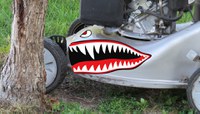Dakota Gardener: Your lawn mower scares trees
(Click an image below to view a high-resolution image that can be downloaded)
By Tom Kalb, Horticulturist
NDSU Extension
Shark Week in America is coming. We can watch horror stories of people getting attacked by sharks all week on television.
Imagine yourself alone in a swimming pool. A trap door in the pool opens and a shark is released. The shark comes toward you. You can hear the water ripple as it swims. It’s rushing toward you, and you are helpless.
This is the way a tree feels when a lawn mower comes near. Absolutely helpless!
Every time you start your mower, every tree in your yard shudders in fear. Your mower—a machine designed to slice through plants with a sharpened steel blade—may soon be brushing against the tree’s bark.
The mower is one of the leading killers of trees in yards, parks and orchards.
Mowers attack bark, the armor of a tree. The bark protects the phloem, a precious layer just beneath the bark where nutrients are carried from the leaves to the roots.
If the bark is damaged, the phloem may be damaged. This reduces the amount of nutrients going to the roots. The weakened roots then struggle to provide the water and minerals from the soil to the rest of the tree.
Trees generally heal when damage is limited to 25% or less of the bark around the tree. As damage levels increase, the tree suffers higher levels of stress. If the bark is stripped around the entire tree, it will die.
If you love your trees, protect them from your lawn mower.
Place a ring of mulch around each tree and follow the “3-3-3 rule.” Place a ring of mulch that is at least 3 feet in diameter around the tree—even more is better. The mulch should be 3 inches deep but keep mulch 3 inches away from the trunk. Heaping mulch against the trunk can create stem rot and provide nesting habitat for bark-biting voles.
Shredded bark and wood chips are best. These wood mulches conserve moisture, smother weeds and enrich the soil. Wood mulches insulate tree roots, keeping them cooler in summer and warmer in winter. Trees love it.
Rock mulch is much less desirable. It traps heat, creating heat stress in summer. In spring, excessive heat may cause trees to open their buds too early, making them vulnerable to frost injury. Rock mulch compacts the soil, scrapes tree bark and provides no nutrients.
Your tree wants some wood mulch. What are you waiting for? The next shark attack may be coming soon!
For more information about gardening, contact your local NDSU Extension agent. Find the Extension office for your county at www.ndsu.edu/agriculture/extension/county-extension-offices.
NDSU Agriculture Communication - July 5, 2022
Source: Tom Kalb, 701-328-9722, tom.kalb@ndsu.edu
Editor: Kelli Anderson, 701-231-6136, kelli.c.anderson@ndsu.edu




